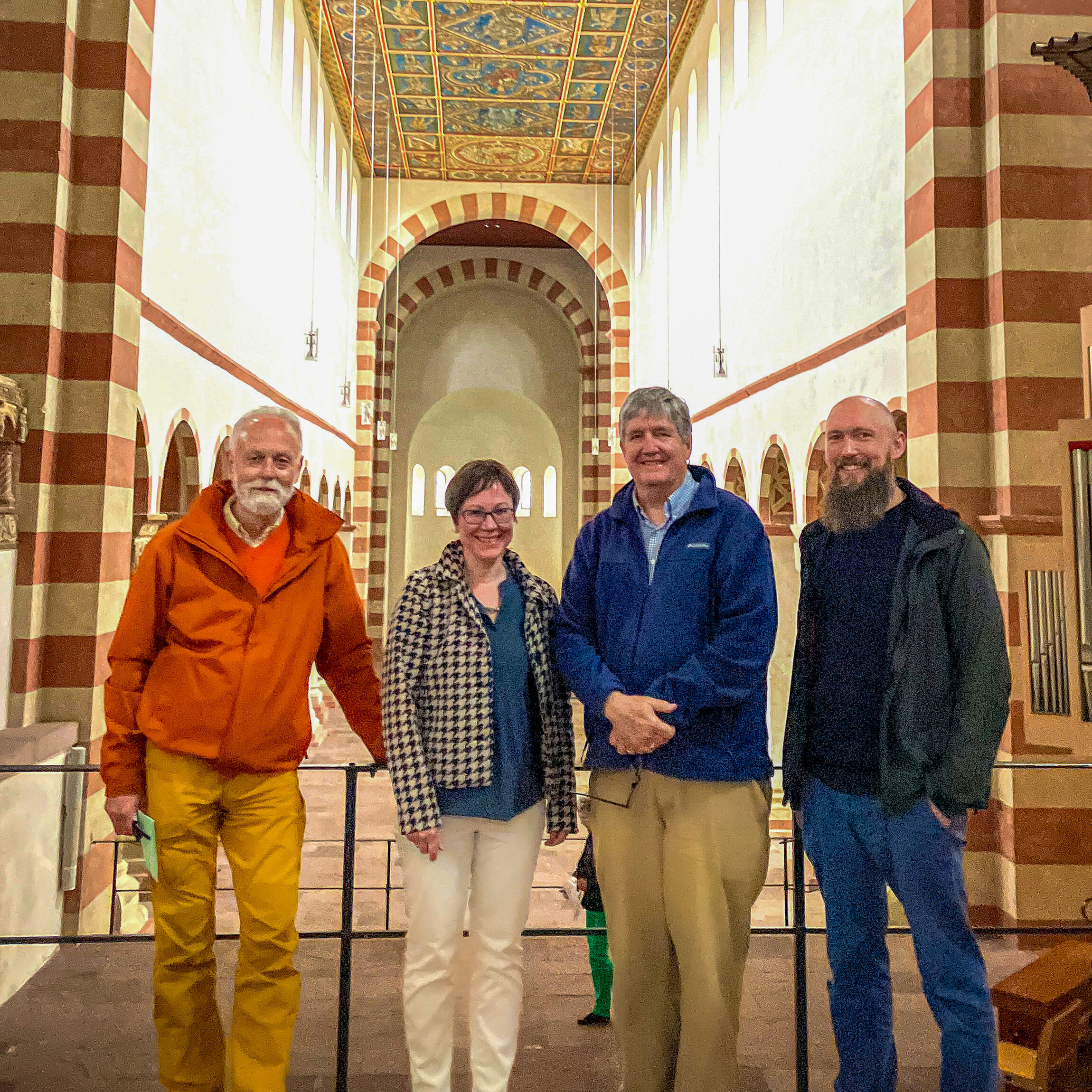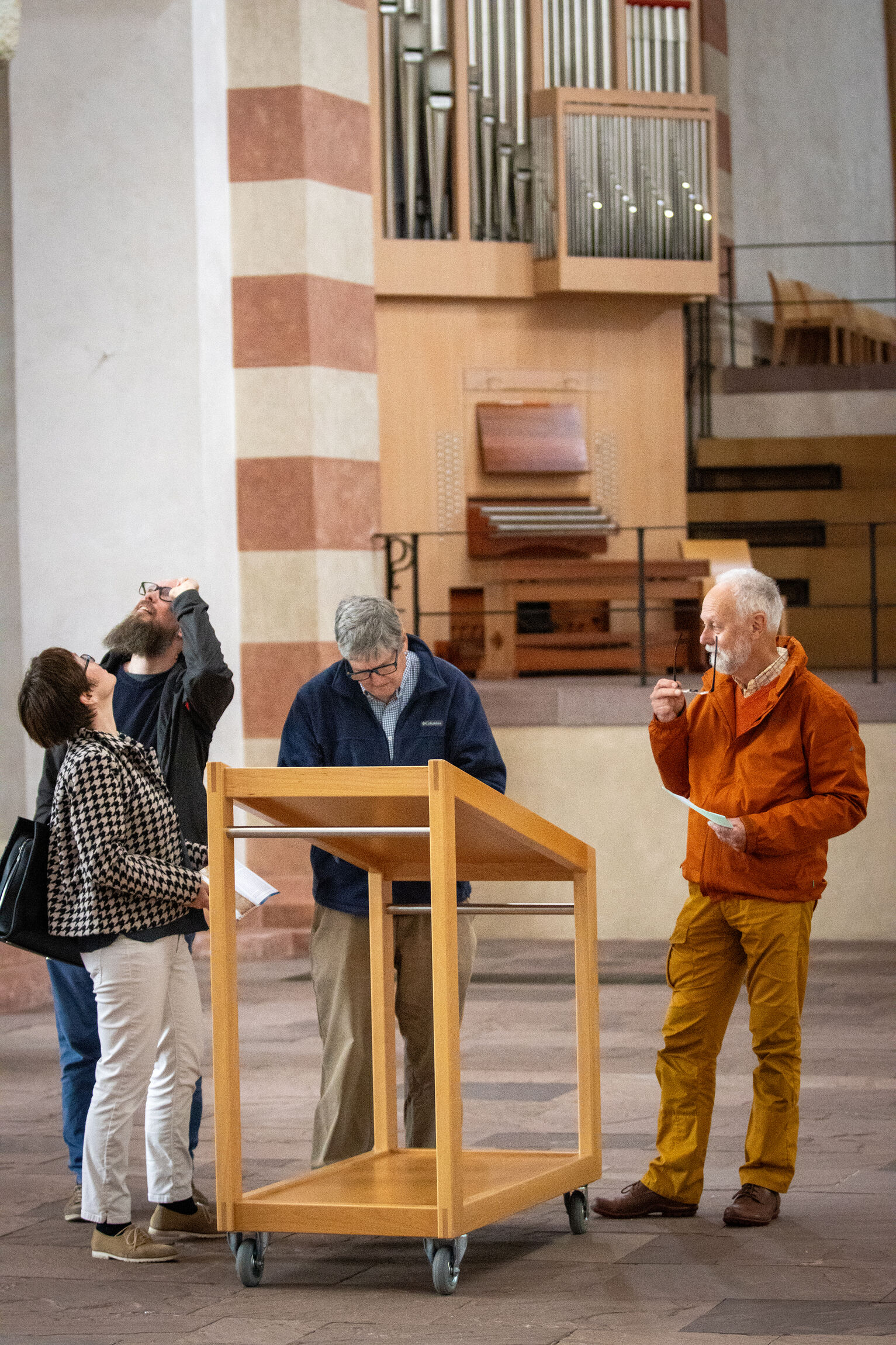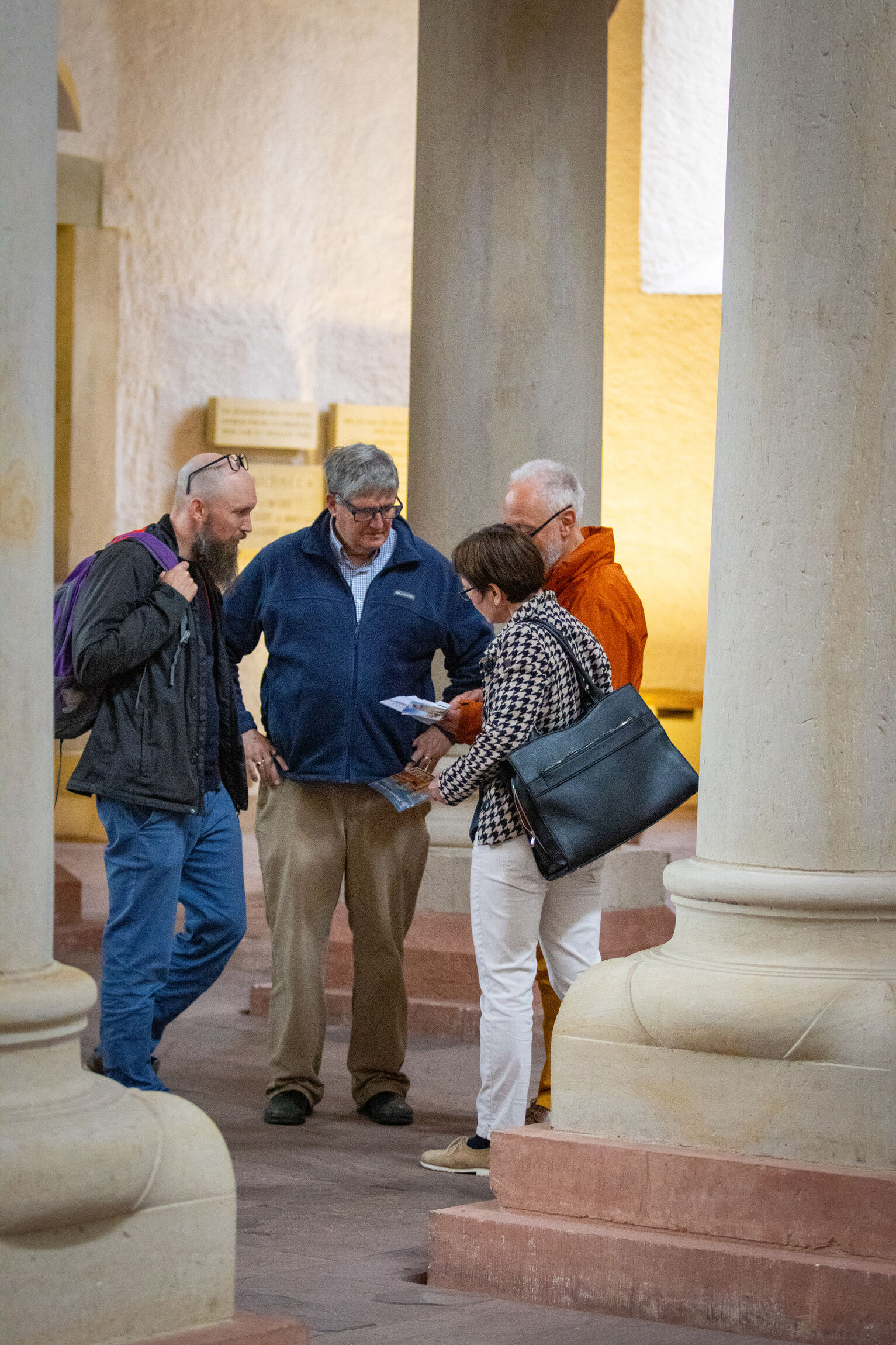Philosoph, Theologe und Mediävist: Der kanadische Wissenschaftler Prof. Robert Sweetman, PhD, hat vor einigen Tagen Hildesheim besucht. Regionalbischöfin Dr. Adelheid Ruck-Schröder begrüßte den vielseitigen Akademiker vor der Michaeliskirche. Sweetman war zu einem Arbeitsaufenthalt in Amsterdam und besuchte in Deutschland dann seinen ehemaligen Schüler und jetzigen theologischen Referenten der Regionalbischöfin, Pastor Dr. Yorick Schulz-Wackerbarth. Der Kirchenvorsteher der Michaelisgemeinde, Jens Kotlenga, führte die drei durch die mehr als tausend Jahre alte Michaeliskirche. Im Anschluss tauschten sich Ruck-Schröder, Sweetman und Schulz-Wackerbarth über die Forschungsgebiete des Kanadiers sowie über aktuelle Fragen zu Kirchen und Religionen aus.
Robert Sweetman, PhD, ist Emeritus H. Evan Runner Chair in der Geschichte der Philosophie am Institute for Christian Studies (ICS) in Toronto. Er hat einen Bachelor vom Calvin College, einen Master of Legal Studies vom Pontifical Institute for Mediaeval Studies und einen PhD von der University of Toronto.
Sweetman begann seine akademische Laufbahn als Mediävist, wobei er sich besonders für die religiösen Impulse im Mittelalter interessierte. Später verlagerte sich sein Forschungsschwerpunkt auf die Geschichte der Philosophie, insbesondere die hochscholastische Philosophie des 13. Jahrhunderts, den Platonismus des 12. Jahrhunderts und die mystische Blütezeit des 13. und 14. Jahrhunderts.
Sweetman erforscht, wie narrative und argumentierende Formen in der Philosophie und Theologie der Antike und des Mittelalters genutzt wurden, um das Verständnis von Selbst, Gott und Welt zu fördern. Besonders interessiert ihn die Rolle der Dominikaner in der Unterstützung der kontemplativen Schriften und Gedanken von Frauen im Mittelalter. Seine Arbeit verbindet die mittelalterliche Philosophie mit der reformationalen Tradition christlichen Denkens, insbesondere durch die Anwendung der problem-historischen Methode von D.H.Th. Vollenhoven.
„Reformational“ bedeutet in diesem Kontext nicht einfach „reformiert“, sondern bezieht sich spezifisch auf die Tradition des reformierten christlichen Denkens, die sich aus der Reformation entwickelt hat. Diese Tradition umfasst theologische und philosophische Strömungen, die aus den Lehren von Reformatoren wie Martin Luther und Johannes Calvin hervorgegangen sind. „Reformational“ bezieht sich auf die Art und Weise, wie diese Denkströmungen die Philosophie, Theologie und Wissenschaften beeinflusst haben und weiterhin beeinflussen, insbesondere innerhalb der protestantischen Tradition.
Zu seinen zahlreichen Veröffentlichungen gehören Bücher wie „Tracing the Lines: Spiritual Exercise and the Gesture of Christian Scholarship“ und „In the Phrygian Mode: Neo-Calvinism, Antiquity and the Lamentations of Reformed Philosophy“. Seine Forschung umfasst eine Vielzahl von Themen, darunter die Rolle der Rhetorik und Erzählung in der Philosophie und Theologie, spirituelle Übungen und die Geschichte der reformationalen Philosophie.
Neben seiner Forschung und Veröffentlichung hat Sweetman auch zahlreiche Abschlussarbeiten betreut und eine Vielzahl von Kursen unterrichtet. Seine Arbeit wird durch ein tiefes Interesse an den Formen von Erzählung und Argumentation geprägt, die er als zentrale Elemente für das Verständnis und die Liebe zur Welt betrachtet. Sein Ziel ist es, von historischen Denkern zu lernen und ihre Beiträge zur heutigen philosophischen und theologischen Debatte zu beleuchten.
Sprengel Hildesheim-Göttingen/ gmu

English Version: In dialogue: Regional bishop in exchange with Canadian theologian
Philosopher, Theologian, and Medievalist: The Canadian scholar Prof. Robert Sweetman, PhD, recently visited Hildesheim. Regional Bishop Dr. Adelheid Ruck-Schröder welcomed the versatile academic in front of St. Michael's Church. Sweetman was on a working visit to Amsterdam and then visited his former student and current theological advisor to the Regional Bishop, Pastor Dr. Yorick Schulz-Wackerbarth, in Germany. Jens Kotlenga, the church warden of St. Michael's congregation, guided the three through the more than thousand-year-old St. Michael's Church. Afterwards, Ruck-Schröder, Sweetman, and Schulz-Wackerbarth discussed the significance of medieval philosophy and theology for modern Christian thought.
Robert Sweetman, PhD, is the Emeritus H. Evan Runner Chair in the History of Philosophy at the Institute for Christian Studies (ICS) in Toronto. He holds a Bachelor’s degree from Calvin College, a Master of Legal Studies from the Pontifical Institute for Mediaeval Studies, and a PhD from the University of Toronto. Sweetman began his academic career as a medievalist, with a particular interest in the religious impulses of the Middle Ages. Later, his research focus shifted to the history of philosophy, especially the high scholastic philosophy of the 13th century, the Platonism of the 12th century, and the mystical flowering of the 13th and 14th centuries.
Sweetman explores how narrative and argumentative forms in ancient and medieval philosophy and theology were used to enhance understanding of the self, God, and the world. He is particularly interested in the role of the Dominicans in supporting the contemplative writings and thoughts of women in the Middle Ages. His work connects medieval philosophy with the reformational tradition of Christian thought, particularly through the application of D.H.Th. Vollenhoven’s problem-historical method.
“Reformational” in this context does not simply mean “Reformed,” but specifically refers to the tradition of Reformed Christian thought that emerged from the Reformation. This tradition encompasses theological and philosophical currents that arose from the teachings of reformers such as Martin Luther and John Calvin. “Reformational” refers to the way these currents have influenced and continue to influence philosophy, theology, and sciences, especially within the Protestant tradition.
Among his numerous publications are books like “Tracing the Lines: Spiritual Exercise and the Gesture of Christian Scholarship” and “In the Phrygian Mode: Neo-Calvinism, Antiquity and the Lamentations of Reformed Philosophy.” His research covers a variety of topics, including the role of rhetoric and narrative in philosophy and theology, spiritual exercises, and the history of reformational philosophy.
In addition to his research and publications, Sweetman has supervised numerous theses and taught a wide range of courses. His work is characterized by a deep interest in forms of narrative and argumentation, which he sees as central elements for understanding and loving the world. His goal is to learn from historical thinkers and illuminate their contributions to contemporary philosophical and theological debates.






